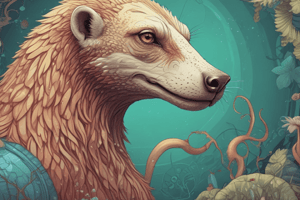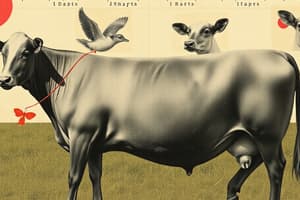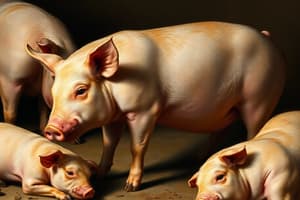Podcast
Questions and Answers
What is the purpose of artificial insemination (AI) in animal science?
What is the purpose of artificial insemination (AI) in animal science?
- To facilitate controlled breeding with specific traits in mind (correct)
- To improve population management in wild species
- To analyze disease resistance in animals
- To study the genetic makeup of animals
Which of the following is NOT a process related to animal reproduction?
Which of the following is NOT a process related to animal reproduction?
- Weaning (correct)
- Parturition
- Gestation
- Breeding
How does artificial insemination (AI) contribute to the efficiency of breeding programs?
How does artificial insemination (AI) contribute to the efficiency of breeding programs?
- By allowing selective breeding with specific desired traits (correct)
- By randomly introducing genetic material from various males
- By increasing the gestation period of females
- By decreasing the speed of breeding programs
What is the role of genetics and genomics in animal reproduction?
What is the role of genetics and genomics in animal reproduction?
In which species would artificial insemination likely be most advantageous based on the text?
In which species would artificial insemination likely be most advantageous based on the text?
What benefit does understanding the genetic makeup of animals provide in animal reproduction?
What benefit does understanding the genetic makeup of animals provide in animal reproduction?
What is the primary goal of studying reproductive physiology in animal science?
What is the primary goal of studying reproductive physiology in animal science?
What is the main purpose of effective breeding management in animal science?
What is the main purpose of effective breeding management in animal science?
How can understanding the impact of diseases on reproductive health benefit the agriculture industry?
How can understanding the impact of diseases on reproductive health benefit the agriculture industry?
What is the connection between studying reproductive physiology and breeding management in animal science?
What is the connection between studying reproductive physiology and breeding management in animal science?
How can the knowledge gained from studying animal reproduction be used to benefit the agriculture industry?
How can the knowledge gained from studying animal reproduction be used to benefit the agriculture industry?
What is the main focus of studying reproductive physiology in animal science?
What is the main focus of studying reproductive physiology in animal science?
Flashcards are hidden until you start studying
Study Notes
Animal Reproduction in Animal Science
In the realm of animal science, one significant aspect is the study of animal reproduction. This involves various processes related to breeding, mating, gestation, and parturition (birth) in domesticated and wild species. Understanding these mechanisms can lead to advancements in animal husbandry practices, genetic improvement, disease prevention, and overall population management. Here's a closer look at some key aspects of animal reproduction within animal science:
Artificial Insemination (AI)
Artificial insemination is a common practice used in animal science to facilitate controlled breeding. AI allows farmers to selectively breed their herds with specific traits in mind, such as disease resistance, increased productivity, or specific genetic traits. This technique involves collecting semen from a male animal, storing it, and then introducing it into the female's reproductive tract using specialized equipment. AI is particularly useful for species like cattle and pigs, where it can significantly improve the efficiency and speed of breeding programs.
Genetics and Genomics
Animal reproduction is closely intertwined with genetics and genomics, as understanding the genetic makeup of animals can help improve breeding strategies. By studying the genomes of different species, researchers can identify specific genes that are linked to desirable traits, such as disease resistance or increased productivity. This knowledge can then be used to breed animals with these traits, leading to healthier, more productive populations.
Reproductive Physiology
The physiological processes that occur during reproduction are a key focus in animal science. This includes understanding the hormonal cycles that control mating, gestation, and parturition, as well as the role of various organs and tissues in these processes. Studying reproductive physiology can help researchers identify potential issues or diseases that may affect fertility and reproductive health, allowing for more effective management and treatment strategies.
Breeding Management
Breeding management is an essential aspect of animal reproduction in animal science. This involves selecting the right animals for breeding, monitoring their reproductive health, and managing their mating schedules to ensure optimal genetic diversity and productivity. Effective breeding management can lead to healthier, more productive populations and a more efficient use of resources.
Disease and Reproductive Health
Reproductive health is closely linked to overall animal health and well-being. Diseases can significantly impact fertility and reproductive success, leading to reduced productivity and potential economic losses for farmers. Understanding the causes and effects of diseases on reproductive health is crucial for developing effective disease prevention and treatment strategies, ultimately improving animal health and welfare.
In conclusion, animal reproduction is a vital aspect of animal science, encompassing various practices and disciplines that contribute to the understanding and improvement of reproductive processes in domesticated and wild species. By studying and applying this knowledge, researchers and farmers can develop more efficient breeding strategies, improve animal health and welfare, and ultimately contribute to a more sustainable and productive agriculture industry.
Studying That Suits You
Use AI to generate personalized quizzes and flashcards to suit your learning preferences.




